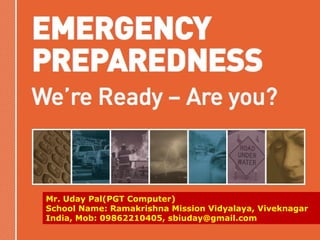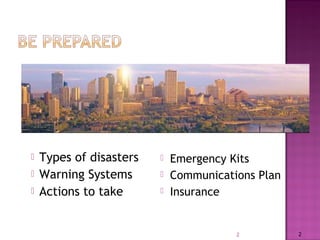Emergency preparedness
- 1. Mr. Uday Pal(PGT Computer) School Name: Ramakrishna Mission Vidyalaya, Viveknagar India, Mob: 09862210405, sbiuday@gmail.com 1
- 2. ï Types of disasters ï Warning Systems ï Actions to take ï Emergency Kits ï Communications Plan ï Insurance 2 2
- 3. 3 ï City of Edmonton Emergency Operation Centre is ready 24 hours a day, 7 days a week to co-ordinate the Cityâs emergency response to a disaster. 3
- 4. 4 4
- 5. 5 5
- 6. ï Be aware of the potential hazards in your community ï Learn the Warning Systems in your area: 6 6
- 7. ï English ï French ï Spanish ï Hindi ï Punjabi ï Chinese ï Vietnamese ï Arabic 7 7
- 8. 8 ALBERTA 1-CALL is the free and easy way to avoid damaging gas, electric and other utility lines that could be buried as close as a few inches underground. 8
- 9. ï Listen to the local radio or TV and follow instructions. ï Shut off utilities if instructed to do so. ï Take your evacuation kit. ï Ensure your pets are cared for. ï Lock up your home. ï Register at the Reception Centre. 9 9
- 10. ï Go inside. ï Close all windows and doors. ï Turn off furnace and exhaust fans. ï Listen to the local radio or TV for further instructions. Keep phone lines free. ï If odour is strong, seal an inside room with wet towels at the base of the door. ï Breathe through a damp towel to filter air. 10 10
- 11. ï Summer storms can bring heavy rain, high winds, hail, intense lightning and even tornadoes, all of which can damage property and threaten lives. 11 11
- 12. ï Winter storms bring the dangers of high winds, extremely low temperatures and heavy snowfall or freezing rain. If caught in a blizzard, seek shelter and wait out the storm. 12 12
- 13. ï Caused by rainfall intensity and duration. ï Go to higher ground. ï Listen to the local radio. ï Avoid already flooded areas and fast flowing water. 13 13
- 14. ï Wash hands often. ï Cover coughs and sneezes with tissues. Cough into your sleeve. ï Stay away from others as much as possible when sick. ï Stay home from work and school if you become sick. ï Get an annual flu shot. ï Get plenty of rest and strive to stay healthy with proper nutrition and exercise. 14 14
- 15. ï Leave immediately if you smell natural gas inside a building. 15 15
- 16. ï Always assume that downed lines are energized. Keep back a minimum of 10 metres (33 feet) from the wires or anything in contact with the wires. ï Warn others in the area of the danger. 16 16
- 17. 17 17
- 18. ï Ready-to-eat and high-energy foods for 3 days ï Manual can opener ï Bottled water ï Extra prescription medications ï Baby supplies, special needs items ï Lanterns, flashlights, lightsticks ï Battery-operated radios, batteries ï Alternate heat sources ï Extra warm clothing and blankets ï Cash ï First aid kit 18 18
- 19. ï Flashlight ï Flares or reflective triangle ï First aid kit ï Basic tools including a shovel ï Extra clothing including hats and gloves ï Booster cables ï Sand or kitty litter ï Ice scraper and brush ï Blanket ï Non-perishable high energy food ï Water ï Small candle in a tin can, waterproof matches 19 19
- 20. ï Food and water for three days ï Disposable litter trays ï Litter or paper towels ï Feeding dishes ï Extra leash ï Petâs blanket ï Photo of your pet 20 20
- 21. ï Home insurance ï Tenant insurance ï Student insurance for living in residence 21 21
- 22. 22 22
Editor's Notes
- Welcome to this presentation on Community/ Personal Preparedness. Self introduction/ background.
- Each year disasters strike in locations across the country. Emergency responders and their partner agencies are there to help those in need. There are things that you can do to assist yourself and family during a disaster. By looking after yourself and family for a minimum of 72 hrs (3 days) you allow responders to help those who require immediate assistance.
- The City of Edmonton and itâs many partners are ready should disaster strike. Edmonton has a Municipal Emergency Plan. The City and itâs partners train on a regular basis to ensure that we can provide the best possible protection and assistance to the citizens in the event of a major incident or disaster.
- Tornadoes Floods Severe Summer storm Severe Winter storm Fires Public Health Emergency e.g. Influenza Pandemic
- Fires Chemical Spills Transportation Accidents (Plane, Train, Vehicle) Explosions Terrorism
- Alerts are distributed to the public through various outlets including: Â Radio and television Internet RSS Feed Social Media (Facebook, Twitter, etc.) Road Signage
- The City of Edmonton in partnership with ATCO Gas has produced an Emergency Guide to assist individuals with personal preparedness The Guide has been translated into eight languages and adapted for use by communities across Alberta.
- Many of Edmontonâs utilities, gas, and electrical are buried. To prevent damage to these lines and for your safety always Dial before you Dig to have the location of the lines marked. This service is free.
- When you are instructed to evacuate because of flooding, fire or other emergencies, do so at once. If a large number of homes are affected, authorities will likely establish a Reception Centre. You may choose to stay at the Reception Centre or stay with family and/or friends. Ensure you register you and/or your family at the Reception Centre. Even if you do not stay this will help to connect you with your friends and family.
- In case of a hazardous chemical release in your community, you may be instructed to âshelter-in-place.â Take immediate shelter where you are â at home, work or school, usually just for a few hours. Act quickly when told to âshelter-in-place.â Follow the instructions of local authorities
- Listen to the local radio or TV station. Remain indoors. During a tornado, go to the basement or under a heavy table or desk. Stay away from windows, outside walls and doors. During a tornado, if you are outside, find shelter or crouch in a ditch, culvert or ravine with your feet together and your head down. During a lightning storm, keep away from trees, power and telephone lines.
- Dress for the weather. Cover head, mouth and nose in extreme cold. Use public transportation if possible. Ensure you have at least half a tank of gas Have a travel kit in your vehicle.
- A flash flood is a rapid rise of water that can be caused by rapid rainfall in a very short period of time. Listen to the local radio Avoid already flooded areas and fast flowing water. Get out of a stalled vehicle immediately in rising water. Move items in basement to higher levels.
- Influenza is an infection of the lungs and airways caused by a virus. It usually affects people in Alberta from November until April. You can protect yourself and keep it from spreading by taking some precautions, using plenty of soap and warm water. If not possible, use alcohol-based hand sanitizer liquids. To limit the spread of germs and prevent infection
- ATCO Gas is on call 24-hours a day, every day of the year responding immediately to calls and emergencies involving: âĒ Natural gas odour âĒ Hit or ruptured natural gas lines âĒ Carbon Monoxide âĒ Natural gas outages âĒ and, in cold weather, if your natural gas furnace is not working If you smell natural gas inside a building: Leave the building immediately
- To report a downed power line in Edmonton, call 911 or EPCOR Emergency Response at 780-412-4500 immediately with information on the exact location of the line. Always assume that downed lines are energized. Tips for an extended power outage: Turn off all electrical appliances and equipment. Keep fridge and freezer closed as much as possible. Stay warm. Gather family members in the warmest room in the house. Dress in layers, draw drapes or cover windows to prevent heat loss. Do not use camp stoves, kerosene heaters or barbecues indoors as they emit Carbon Monoxide. Gas stoves used as a heat source for long periods without ventilation will do the same. Ensure you have access to a phone that doesnât need power to operate, or a cell phone. Cordless phones wonât work without power. Ensure your vehicle is topped up with fuel at all times.
- Keep in a easy-to-carry container that is easily accessible, e.g. Rubbermaid on wheels, knapsack, duffel bag Prescription and non-prescription medications Non-perishable food Manual can opener Bottled water Battery-powered radio Flashlights Extra batteries Extra clothes Cash and credit cards Important documents First aid kit Special needs items â baby, elderly, disabled, pets
- If evacuated from your home, Canadian Red Cross provides support services for immediate needs (food, clothing, shelter) for 72 hours (three days) Home/tenant insurance can help to keep you covered while out of your home Students can get a rider placed on their parents home insurance






















